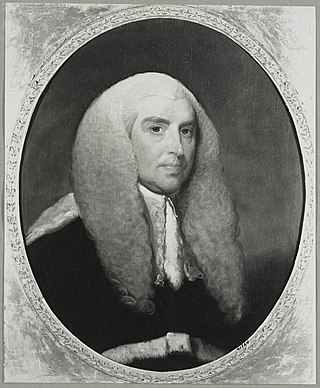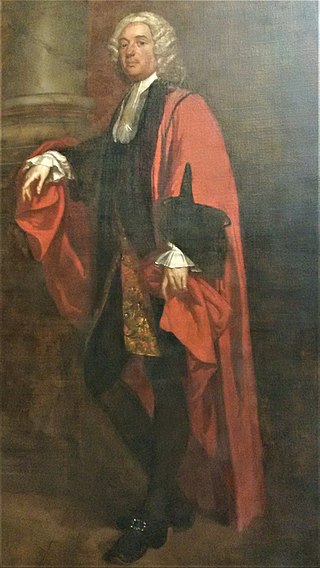Related Research Articles

Hugh Carleton MRIA, 1st Viscount Carleton, PC (I), SL was an Irish politician and judge.
Sir Richard Pyne was an Irish landowner, barrister and judge. He held office as Lord Chief Justice of Ireland from 1695-1709.
Sir Thomas Luttrell was a wealthy Anglo-Irish landowner of the sixteenth-century Irish Pale. He was also a distinguished lawyer and judge who held the offices of King's Serjeant, Solicitor General for Ireland and Chief Justice of the Irish Common Pleas.
Sir John Barnewall (c.1635-c.1705) was an Irish landowner, barrister and judge, who held several judicial offices, including that of Recorder of Dublin 1687-9.
Sir John Meade, 1st Baronet (1642–1707) was an Irish barrister, judge and politician. He was the first of the Meade Baronets of Balintubber, and an ancestor of the Earls of Clanwilliam. He was unusual among the lawyers of his time for his lack of ambition to become a judge of the High Court, despite being generally regarded as a barrister of "excellent parts (qualities)". In matters of religion, he seems to have been, by the standards of his time, a man of very tolerant views: although he was himself a Protestant, he damaged his career by marrying Elizabeth Butler, who was a Roman Catholic, as his third wife.

Sir Thomas Pakenham (1649-1703) was an Irish barrister and politician: he sat in the Irish House of Commons as MP for Augher and held the office of Serjeant-at-law (Ireland). He was the grandfather of the first Baron Longford.

Sir James Chatterton, 1st Baronet, was an Irish lawyer and politician, and the first of the Chatterton Baronets of Castle Mahon.
Attiwell Wood (1728-1784) was an Irish politician, barrister and Law Officer of the eighteenth century.

Eaton Stannard (1685–1755) was a leading politician and lawyer in 18th-century Ireland. He was a popular Recorder of Dublin, a very unpopular serjeant-at-law (Ireland), and an experienced parliamentarian who represented Midleton in the Irish House of Commons for many years. He is mainly remembered now as a close friend of Jonathan Swift, whose last known letter was written to him.

Henry Purdon was an Irish barrister, politician and Law Officer of the early eighteenth century. He sat in the Irish House of Commons and held the Crown office of Third Serjeant.
Maurice Coppinger was an Irish barrister and politician, who sat in the Irish House of Commons for many years, and held the office of King's Serjeant. His name is commemorated in Coppinger Row, a side street in central Dublin city; his townhouse was on South William Street nearby.
David Sherlock was an Irish Liberal Party and Home Rule League politician. He was also a successful barrister and Law Officer.
Sir Robert Warren, 1st Baronet JP was an Anglo-Irish landowner and businessman who owned Warrenscourt House and Crookstown House in County Cork.
Sir Edward Loftus (1563–1601) was an Irish barrister, judge and soldier of the Elizabethan era.
William Thompson (1766–1833) was Archdeacon of Cork from 1800 until his death.
Robert Dixon (1685-1732) was an Irish barrister, judge and politician who served very briefly as a justice of the Court of Common Pleas (Ireland).
Sir John Bourke Howley (1789-1866) was an Irish barrister and Law Officer who held office as Serjeant-at-law (Ireland) for many years. Despite his obvious desire to be promoted to the Bench, he never became a judge.
John Cliffe (1661–1728) was an Irish barrister, landowner and politician. He sat in the Irish House of Commons for many years, where he was often called on to speak for the Government, and held the office of Serjeant-at-law (Ireland).
Richard Keatinge (1793-1876) was an Irish barrister and judge who served for many years as the Irish Probate judge. He and his wife Harriet Augusta Joseph has a number of distinguished descendants, including an eminent scientist, a famous novelist and a recipient of the Victoria Cross.

Hewitt Poole Jellett was an Irish barrister and judge. He is notable for holding the office of Serjeant-at-law (Ireland) for more than twenty years until his death at the age of eighty-six.
References
- Mosley, Charles, ed. Burke's Peerage 107th Edition Delaware 2003 Vol. 3
- Hart, A. R. History of the King's Serjeants at law in Ireland Four Courts Press Dublin 2000